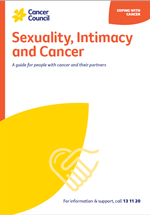- Home
- Cancer Information
- Managing side effects
- Sexuality, intimacy and cancer
- Resuming sexual activity after treatment
- Communicating with your partner
Communicating with your partner
Misunderstandings, different expectations and conflicting ways of dealing with change, can all cause tension within a relationship. The key to adjusting to sexual changes after cancer is communication.
It may help to talk about how you’re both feeling, your concerns and your needs, as well as ways you can adapt intimacy and sexual activities during and after cancer treatment. Even people who are comfortable sharing their thoughts with their partner, may not have openly talked about sex before. Common reasons people may avoid talking about sex include: embarrassment; lack of time or privacy; lack of confidence or fear of rejection; fear of getting cancer; waiting for the other person to mention it; and assuming that things are back to normal.
It can seem easier to avoid talking about sex when you are both coping with the demands of cancer and treatment, but this often leads to frustration and confusion, as neither of you will feel like you are having your needs met. Let your partner know what you’re going through and how they can help you cope. It may help to talk about how your relationship is changing and that you both need time to adjust.
Sometimes it’s better to have these talks outside the bedroom. To avoid any confusion or feelings of pressure, consider talking about sex at a time when you aren’t usually going to be having sex.
Tips for communicating with your partner
- It helps to set aside time for other types of intimacy.
- Plan to have a regular meal together or go for a walk.
- Try to focus on sensual activities that don’t involve penetrative sex, such as hugging, skin-to-skin contact or massage.
- If you need support talking to each other, consider counselling – call Cancer Council 13 11 20 or ask your doctor or nurse how to find a counsellor in your area.
- Listen to our podcast on Sex and Cancer below.
→ READ MORE: How to start a conversation about sex
Podcast: Sex and Cancer
Listen to more of our podcast for people affected by cancer
More resources
Dr Margaret McGrath, Head of Discipline: Occupational Therapy, Sydney School of Health Sciences, The University of Sydney, NSW; Yvette Adams, Consumer; Dr Kimberley Allison, Out with Cancer study, Western Sydney University, NSW; Andreea Ardeleanu, Mental Health Accredited Social Worker, Cancer Counselling Service, Canberra Health Service, ACT; Kate Barber, 13 11 20 Consultant, Cancer Council Victoria; Dr Kerrie Clover, Senior Clinical Psychologist, Psycho-Oncology Service, Calvary Mater Newcastle, NSW; Maree Grier, Senior Clinical Psychologist, Royal Brisbane and Women’s Hospital, QLD; Mark Jenkin, Consumer; Bronwyn Jennings, Gynaecology Oncology Clinical Nurse Consultant, Mater Health, QLD; Dr Rosalie Power, Out with Cancer study, Western Sydney University, NSW; Dr Margaret Redelman OAM, Medical Practitioner and Clinical Psychosexual Therapist, Sydney, NSW; Kerry Santoro, Prostate Cancer Specialist Nurse Consultant, Southern Adelaide Local Health Network, SA; Simone Sheridan, Sexual Health Nurse Consultant, Sexual Health Services – Austin Health, Royal Talbot Rehabilitation Centre, VIC; Prof Jane Ussher, Chair, Women’s Heath Psychology and Chief Investigator, Out with Cancer study, Western Sydney University, NSW; Paula Watt, Clinical Psychologist, WOMEN Centre, WA.
View the Cancer Council NSW editorial policy.
View all publications or call 13 11 20 for free printed copies.
Need to talk?
Support services
Coping with cancer?
Speak to a health professional or to someone who has been there, or find a support group or forum
Life after cancer treatment
Webinars, exercise and nutrition, sexuality programs, and back-to-work support
Cancer information
Your coping toolbox
Strategies for managing difficult situations during and after cancer treatment
View our publications
Guides and fact sheets for people with cancer, their families and friends

